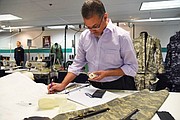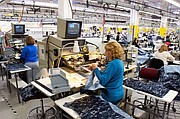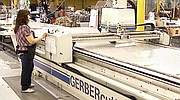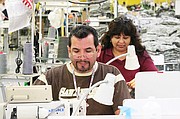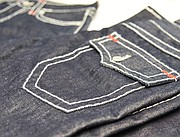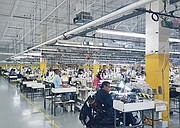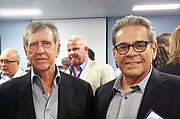MANUFACTURING
Roicom USA: Texas Factory With High-Tech, Denim Expertise and Social Message Looks to L.A.
Apparel factory Roicom USA is based in El Paso, Texas, but the company has Los Angeles’ denim community in its sights.
The company is planning to lure denim brands—and other apparel makers—to Texas with state-of-the-art machinery, seasoned denim-industry executives and turnkey operations that include shipping and customer service. Company executives also hope Texas’ lower minimum wage, plentiful water and high-tech finishing on both sides of the U.S./Mexico border will provide further incentive to Southern California apparel makers. But it might be the altruistic mission behind Roicom that wins over the hearts of those committed to Los Angeles production.
Roicom is the commercial sister company to ReadyOne, a not-for-profit 501(c)(3) sewing factory that produces apparel and other softgoods for the U.S. military. ReadyOne is a member of a federal program that provides jobs for severely disabled people, including disabled veterans. Those workers are among ReadyOne’s more than 1,000 employees, who work alongside a management team comprised of former Levi Strauss & Co. and VF Corp. executives.
One of those executives is Roy Schiefner, general manager for Roicom USA, whose career includes more than two decades at Levi’s as well as stints at Calvin Klein, The Wet Seal and Los Angeles private-label maker GMPC Inc.
“ReadyOne is a member of the federal government’s AbilityOne Program, which means that 75 percent of our work hours has to be performed by folks with severe disabilities,” Schiefner said. “We transform these folks into an able workforce by training, modifying and automating machines and their work space and equipment to compensate their disability and by so doing help them to be self-reliant with dignity and respect.”
The company pays disabled employees full market wages, provides transportation to and from work, has an on-site clinic and retrofits machinery to compensate for workers’ disabilities. ReadyOne is an ISO 9001:2008-certified manufacturer. Within ReadyOne’s 345,000-square-foot facility, there are more than 2,000 sewing machines as well as specialty fusing, seaming and heat pressing machines, programmable tackers, automatic cutters, and embroidery machines—“many of which are adapted to assist our disabled staff,” Schiefner said.
Roicom USA was formed “to directly address the commercial apparel market outside the restraints of the parent non-profit,” he said.
The cost of doing business at ReadyOne is higher than at Roicom, where a focus on automation helps the company achieve a much higher efficiency sewing rate,” Schiefner said.
The management team—which include Schiefner, Cynthia DeHaro, Roicom’s vice president and Antonio Martinez, the company’s president and chief executive officer—is currently ramping up the staff at Roicom. The 190,000-square-foot facility can work with larger production orders as well as orders as small as 500 units, Schiefner said, adding that Roicom’s turn times are significantly faster than the typical 90-to-120-day turn time for offshore production.
“We’re able to execute 35-day turnarounds from receipt of fabric [and] trims,” he said.
Denim focus
Roicom’s team can produce anything ReadyOne already does, which includes woven shirts, T-shirts, pants, shorts, workwear, outerwear and headwear. ReadyOne also produces items made with specialty fabrics such as Kevlar and fire-retardant fibers. ReadyOne’s military production includes sleeping bags, tents and sacks. The factory can make embroidered items and does heat-transfer decals.
But for Roicom, Schiefner and his team are currently focusing on two key markets: denim and activewear.
According to Scheifner, Roicom’s team can work with “a wide range of material options as well as exotic laminations and insulations, knits and wovens—especially in performance and technical fabrics that can be used for athletic, dress/casual and outdoor wear. Fabrics range from cotton to wool and everything in between.”
The company offers a turnkey solution that includes research and development, sourcing, design, sewing, washing and finishing, warehousing, distribution, and delivery. Roicom even has access to ReadyOne’s corrugated packaging division, call center and third-party logistics.
Finishing is sent to International Garment Processors (IGP), a cut-and-sew and finishing facility located across the Mexican border in Chihuahua. IGP recently opened a second operation in El Paso for made-in-America production. IGP techs can launder and finish denim by hand or by using waterless laser finishing.
SoCal target
Not long ago, El Paso was a significant denim hub, and much of the technical knowledge and skill is still in the region.
“In the ’80s and ’90s, El Paso was the finishing center in the U.S. and once again can establish itself as an important center for jeans made in the USA,” Schiefner said.
Roicom is already producing for two large international brands as well as a few Southern California surf brands and is in negotiations with several premium-denim labels. Schiefner said he sees California as “a really good opportunity,” particularly with the state’s recent minimum-wage hike and California’s ongoing drought.
To help build business, the company brought in Mark Singer as account executive. Based in California, Singer is handling all U.S. sales for Roicom. Singer is a longtime manufacturer who produced under the Softwear by Mark Singer and Vikki Vi labels.
Singer said he thinks Roicom is a good production resource for Southern California’s denim brands “with what’s happening in LA today with labor, the lack of water, and the cost of living and utilities.”
In Texas, the minimum wage is $7.25 per hour. California recently approved plans to raise the minimum wage from $10 per hour to $15 per hour by 2022. (The federal minimum wage currently stands at $7.50 an hour.)
“In addition to the emotional story, the dollars-and-cents story is a compelling reason to move production to Texas to make a better margin,” Singer said. “It’s not just your employees. It’s your cutters, your sewer, the washer, the warehouse, the shipper. Everything is going up to $10.50 per hour [on Jan. 1 for California workers]. It’s a big savings.”
Plus, Singer noted, Texas has a long track record of producing denim for American brands.
“El Paso was the center of denim manufacturing,” he said. “They are deeply entrenched in the DNA of the product. Plus, there’s plenty of water in Texas.”
